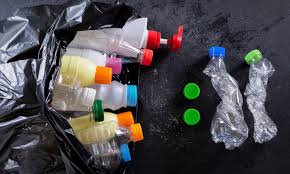Scientists from Malaysia and Japan have found a simple technique to return PET, a common plastic, to its natural state. Because it can separate PET from mixed polymers and textiles, this approach is especially efficient. The journal Industrial Chemistry and Materials has published a thorough report of their research.
PET water bottles are recyclable if they are melted down and reshaped; however, doing so typically results in the plastic losing quality and needs to be carefully separated from other components. Because it is difficult to separate individual fibers from mixes like poly-cotton, this procedure is not effective with mixed waste or polyester textiles.The recently developed process just needs alcohol and a cheap iron-based catalyst, and it works at temperatures below 200 °C, which is low by industrial standards.
Diethyl terephthalate and ethylene glycol, two nearly pure monomers that can be utilized to create premium PET and other materials, were produced by them in their investigation. The researchers tested the ferric chloride catalyst on a textile composed of 35% cotton and 65% PET because it showed to be especially effective. They succeeded in removing the monomers from the textile in 16 hours, leaving only pure monomers and cotton.
Additionally, they showed how this technique may be used to extract PET specifically from textile mixes that contain various plastics. Ferric chloride is an inexpensive catalyst that is already widely utilized in many different industries, according to the researchers. They think that by employing a readily available catalyst, this approach might result in a chemical recycling process that is cleaner. Now that the weather is considerably milder, the team is investigating if they can still get comparable outcomes.

